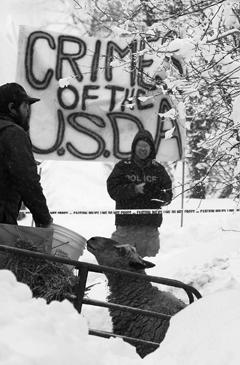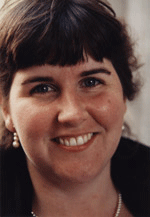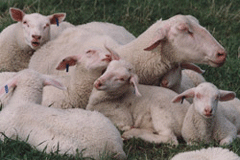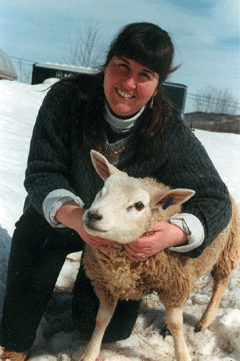Mad Sheep
Air Date: Week of November 17, 2006

Jacques is taken by the USDA. (Courtesy of Chelsea Green Publishing)
In 2001, the USDA seized and slaughtered a flock of sheep that belonged to a Vermont farming family. The government thought the sheep might be infected with a strain of Mad Cow Disease, but the Faillace family accused the USDA of shoddy science. Linda Faillace wrote a book about her family's experience and shares her story with Living on Earth’s Steve Curwood.
Transcript
GELLERMAN: It’s Living on Earth. I’m Bruce Gellerman. In 2001, fears that Mad Cow Disease had infected sheep on a family farm in Vermont, prompted federal authorities to take extreme action.
NEWSCAST: The government moved in at daybreak. Dozens of federal agents flanked by workers for the US. Department of Agriculture arrived at the Faillace farm in Warren to round up the 125 sheep. The owners meanwhile went about their chores in the barn, feeding the animals one last time.
GELLERMAN: Local TV station WCAX was on the scene in Vermont as Larry and Linda Faillace tried to stop the seizure and slaughter of their animals. After all, Mad Cow disease had never before been found in sheep.
NEWSCAST: The Faillace’s were surrounded by supporters as the animals were loaded, some stunned that the government did not want to hear an appeal to the case scheduled for April 10th. But the government says the risk to public health is too great and the animals must be destroyed. The demonstration was peaceful and there was no interference.
GELLERMAN: The Faillace family’s flock weren’t just any sheep. They were the first of their kind in America—rare breeds imported from Europe that produced unusually high quality meat and milk. Linda Faillace has written a book about her family’s experience called “Mad Sheep.” Living on Earth’s Steve Curwood recently spoke with Linda Faillace and her daughter Heather.
CURWOOD: Now you guys have been through quite an ordeal. It’s been six years now since you lost your flock. Why did you write the book?

Author Linda Faillace (Photo: Dr. Larry Faillace)
CURWOOD: Now I know that there’s a related form of disease in sheep, it’s known as scrapies that’s not dangerous to humans. But mad cow disease in sheep? How would that be possible?
L. FAILLACE: Um, it’s not. Only under a laboratory have they been able to make sheep come down with mad cow disease. And so this was a theory that USDA came up with. And they said your sheep could have possibly been exposed to contaminated feed and be susceptible to mad cow disease. And if they had mad cow disease that would be traumatic and would you know possibly destroy the entire American sheep industry along with the cattle industry.
CURWOOD: Well, how did the government come to the conclusion that your sheep were sick?
L. FAILLACE: Without any evidence. Every single one of our sheep tested negative for any sort of disease, even the disease of scrapies which sheep can get.
CURWOOD: I’m now thoroughly confused. If your sheep tested negative for any form of this disease, how was it that the USDA was able to seize them?
L. FAILLACE: Right from the beginning it was very suspicious and very fishy because they said it was an atypical TSE of foreign origin. TSE is the umbrella term for diseases which include mad cow disease and scrapies and chronic wasting disease in elk and a few more. So by giving it this title it made it so the USDA did not have to follow their own protocols.

Jacques is taken by the USDA. (Courtesy of Chelsea Green Publishing)
L. FAILLACE: What they did was they kept testing all the animals and all the animals were testing negative. USDA put us under a formal quarantine, and after two years when we refused to give up the animals, they sent it to this outside lab, Richard Rubenstein’s lab on Statten Island. He comes up with the contrived positives.
CURWOOD: That’s a very strong charge, contrived test results. You’re alleging fraud on the part of this laboratory.
L. FAILLACE: Exactly. And then he claims in court when the judge – the federal district court judge – tells him to rerun the samples, he said oh, I inadvertently disposed of any remaining tissue samples. And he had enough samples from each animal that he could have the test a minimum of 25,000 times.
CURWOOD: These are very serious charges.
L.FAILLACE: And I’ll stand behind them.
CURWOOD: It’s clear from the book that the farm involved everyone in the family. And Heather, you’re now a junior at Middlebury College in Vermont. What were some of the tasks that you and your brother and sister were in charge of on the farm?
H. FAILLACE: Well, my tasks involved every morning from May to October twice a day getting up and milking the sheep. My sister made the cheese and my brother was pasture manager.
CURWOOD: Do you have a copy of your mom’s book there with you?
H. FAILLACE: Yes.
CURWOOD: On the front cover of your mom’s book, “Mad Sheep: the True Story Behind the USDA’s War on a Family Farm,” there’s a sheep sticking her face out of an animal carrier. Tell me about this sheep.

“All the lambs loved Martha, an East Friesian ewe.”(Photo: Amalia Elena Veralli)
CURWOOD: I’m so sorry.
H. FAILLACE: That’s Martha. She was one of my best milkers. We spent so much time with the animals every day that they became more like pets and family members. You grow up being taught that you should trust the government and then something like this happens and you just loose all faith. We lost our whole livelihood.
CURWOOD: Linda, your children were obviously so closely involved in this. How do you feel about that today?
L. FAILLACE: It’s really hard because it was a true family farm. Excuse me. Now I’m getting emotional. I don’t even know how to say it. It was something that I never ever expected to experience, I never ever expected my children to experience. I am extremely grateful for the opportunity to have had a farm. (pause breaks down) And I won’t, I won’t let USDA take that away.
CURWOOD: At the end of the day, why do you suppose all this happened?
L. FAILLACE: (takes a deep breath) I, I think the USDA’s trying to cover up the fact that they’re really really negligent at testing for mad cow’s disease in this country. I do not have faith in the food safety aspect of USDA. I have, I feel that food safety lies in the hands of the small farmers not in the hands of the USDA. USDA is too controlled again by the very agencies they’re supposed to regulate. And so I think that we were an example of USDA playing into the hands of politics and not abiding by science.
CURWOOD: You’re still on your farm. You’re still active in Vermont cheese making. What are your plans for the future?

Linda Faillace and Moe. (Courtesy of Chelsea Green Publishing)
CURWOOD: How do you feel about your parents telling the story and maybe going back into farming themselves?
H. FAILLACE: I think it’s very important that our story gets out there. But as far as farming again, you know if they have the strength to, then I’ll be very supportive of that decision so…
L. FAILLACE: But you think we’re nuts?
H. FAILLACE: Yeah, but I think you’re crazy.
CURWOOD: Linda Faillace’s book is called, “Mad Sheep: the True Story Behind the USDA’s War on a Family Farm.” Thank you.
L. FAILLACE: Thank you Steve.
CURWOOD: And thank you, Heather.
H. FAILLACE: Thank you.
[MUSIC: Christmas Baubles “S” from ‘Christmas Baubles and Their Strange Sounds’ (Lo Recordings – 2002)]
GELLERMAN: Living on Earth asked both the USDA and the government’s former expert on mad cow disease, Dr. Linda Detweiller, to respond to Linda Faillace’s allegations. Both declined to comment, citing an ongoing lawsuit between the government and the Faillace family.
Links
The Fallaice Family website Rootswork: Schoolhouse Market and Three Sheperds Cheeses
"Mad Sheep: The True Story Behind the USDA’s War on a Family Farm"
USDA Fact Sheet on sheep test results (2002)
Official notice from the Federal Register of the USDA's State of Emergency to Seize the Sheep
Living on Earth wants to hear from you!
Living on Earth
62 Calef Highway, Suite 212
Lee, NH 03861
Telephone: 617-287-4121
E-mail: comments@loe.org
Newsletter [Click here]
Donate to Living on Earth!
Living on Earth is an independent media program and relies entirely on contributions from listeners and institutions supporting public service. Please donate now to preserve an independent environmental voice.
NewsletterLiving on Earth offers a weekly delivery of the show's rundown to your mailbox. Sign up for our newsletter today!
 Sailors For The Sea: Be the change you want to sea.
Sailors For The Sea: Be the change you want to sea.
 The Grantham Foundation for the Protection of the Environment: Committed to protecting and improving the health of the global environment.
The Grantham Foundation for the Protection of the Environment: Committed to protecting and improving the health of the global environment.
 Contribute to Living on Earth and receive, as our gift to you, an archival print of one of Mark Seth Lender's extraordinary wildlife photographs. Follow the link to see Mark's current collection of photographs.
Contribute to Living on Earth and receive, as our gift to you, an archival print of one of Mark Seth Lender's extraordinary wildlife photographs. Follow the link to see Mark's current collection of photographs.
 Buy a signed copy of Mark Seth Lender's book Smeagull the Seagull & support Living on Earth
Buy a signed copy of Mark Seth Lender's book Smeagull the Seagull & support Living on Earth

